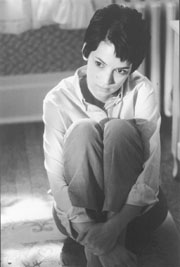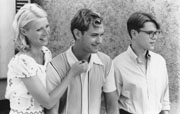Shakespeare's popular tragedy about ambition and murder gone awry is brought to life in violent and supernatural tones by the Allied Theatre Group at Stage West. In this latest production of "Macbeth," the heroic leader by the same name succumbs to the guilt and rage that result from his ambitious murder of King Duncan. Both Macbeth and his wife, Lady Macbeth, envision Duncan's ousting as a way to seize power. Yet this act creates a domino effect of more murders and more guilt, causing Lady Macbeth to go crazy and Macbeth to experience a sort of nervous breakdown. The complex characters of Macbeth and Lady Macbeth (played by John Wayne Shafer and Evette Perry-Buchanan) provide much food for the audience's thought because they are not portrayed as the "bad guys." Instead, we can see the vulnerability of Macbeth (and to a lesser degree Lady Macbeth), forcing us to try to understand and even sympathize with their brutal deeds and the consequences of their actions. "Macbeth" was probably written shortly after the Gunpowder Plot in 1605, according to the Stage West playbill. During this event, 36 barrels of gunpowder were placed under the Houses of Parliament in order to kill the king and English government officials. The assassination of kings and the following chaos, therefore, was an important issue to Shakespeare's audience. Jim Covault, artistic director of this performance of "Macbeth," captures this danger by setting the play in the years between the two World Wars. The effect is a plot that is safely distant from present time but close enough so that the audience can relate to the same issue that plagued Shakespeare's audience. So should you check out this modern take on "Macbeth"? Shakespeare enthusiasts will most likely enjoy this production. Those students and faculty not accustomed to the language in "Macbeth," however, will probably have a difficult time following the suspenseful current of the play. Scenes heavy with dialogue often lack movement and energy. Lessening the effect of some scenes even more is the rapidly spoken dialogue which is, at best, challenging for the audience to articulate. We know that something urgent is happening because of the voices, but we are lost to this important meaning in the play. But "Macbeth" does have many engrossing scenes that break up the confusing ones. The seducing, ruthless character Lady Macbeth, for instance, energizes Act I because of Perry-Buchanan's strong presence on stage and her clear delivery of Shakespeare's vivid lines. In her scenes, we are able to appreciate the poetry of Shakespeare's writing. Shafer also powerfully plays the morally-torn and enraged Macbeth. At first, his heavy body and fair features may not seem the look of a hero, but Shafer's range of emotions - from uncertain to controlling to uncertain again and then to guilt and rage - make him not only believable but also fascinating to watch. The cultist, orgiastic witches are a bit disappointing, though. Wearing black, blood splattered trench coats, they mutter spells like zombies. During the first part of "Macbeth," the supernatural presence of the witches does not seem in sync with the corruption of power in the tragedy. In fact, even though the witches prophesy Macbeth's future, they seem like more of an interruption to the reality of the play. In the second part of the tragedy, however, the witches are clearly entertaining and purposeful with the help of the demonic Hecate. Red lighting and witchcraft props also absorb the audience and support the supernatural feel in "Macbeth." Toward the end of the production, audience members looked tired and not drawn into the play's story line. A thrilling sword fight between Macbeth and Macduff, however, invigorated the play, bringing the audience back to the tragic finale.
Danielle Daniel
"Left Behind," a novel written by Tim LaHaye and Jerry B. Jenkins, is a fictional account of the Biblically forecasted rapture and the tale of those who were not welcomed into God's Kingdom. Just in time for the millennium, this popular book provides an interesting and realistic view of the world after a cataclysmic moment but falls short of strong characterization and a universal religious message. "Left Behind" opens with a seemingly average scene: Forty-something airline pilot Rayford Steele is en route to London, a flight he has made many times, and he is contemplating cheating on his Bible-beating wife with a pretty young flight attendant. His passengers are sleeping, reading, patiently awaiting the arrival of the drink cart, when suddenly people all over the world disappear. They leave their clothes behind and simply vaporize into thin air. While this seemed a little too "sci-fi" for me at first, I soon came to realize that LaHaye and Jenkins had very little detail of the actual rapture to work with from the Bible and did the best they could. On board the fateful flight to London is another passenger, a young journalist named Buck Williams, who later becomes a central character in the novel. Williams is headstrong, adventurous, and the chapters that focus on him provide a needed contrast to Rayford's early story line, which consists of him sitting around drinking to mourn the loss of his wife. Buck's adventures in the fast-paced world of journalism offer a creative presentation of the political aftermath of the rapture. While the millions all over the world who truly knew God moved on to live in eternal peace, ironically, all of the politicians remained on Earth. Buck follows the rising of a young Romanian leader named Nicolae Carpathia and Carpathia's attempts to form one-world government and establish a world religion. His dynamic twists and turns will not only keep the pages turning but also cause you to step back and shudder at the possibility of such chaos occurring on this planet. Much like a country defeated by war, the world portrayed in "Left Behind" is hopeless and distracted, ready to embrace any leader who brings a promise of a better life. Action, adventure and religious dilemma are all painted into the plot of this novel. All that is missing is romance. This novel is full of religious undertones and messages. Clearly written for a Christian-American audience, "Left Behind" borders on Christian propaganda. Hundreds flock to New Hope Village Church with Rayford after the disappearances, seeking answers and comfort. Many of them convert during the course of the book. LaHaye and Jenkins seem to be saying, "Jesus is the only way," as Rayford pushes that message on his remaining family and friends. Now, this is America, and authors are certainly entitled to their opinions, but for those who are still a little unsure of your beliefs and faith, this strong, constant message may make you a little uncomfortable. "Left Behind" is the first in a six-part series about the Earth's last days. Although strewn with a few little annoying events, "Left Behind" definitely held my attention and left me wondering what would happen next. If you are comfortable with your faith and looking for a fast read on a hot topic, give this novel a try. However, if you don't want Christianity pushed on you, try something a little less forward.
Jill Craig is a freshman psychology major from Arlington Heights, Ill. She can be reached at (jpcraig@delta.is.tcu.edu).
Girl, Interrupted For every movie, you have to be in a certain mood. Girl, Interrupted is for one of those moods where anything goes. But I was very skeptical about this movie. I thought it would be too depressing, too violent and have just too many girls. And honestly, Angelina Jolie somewhat scares me. But I was extremely impressed and found myself anticipating every scene.
As always, Winona Ryder takes my breath away. She is just amazing to watch. It's possible to say that this is her best performance ever. In such a horrible setting, this group of girls learns the importance of friendship and love. RANKING: * * * * - Lindsay Williams
Cider House Rules The Cider House Rules is a heart-wrenching but ultimately uplifting film. Tobey Maguire (Ride With the Devil, The Ice Storm) is perfect as Homer Wells. Homer is a young man who has found his home in the orphanage where he was born and a father figure in its patriarchal Dr. Larch (Michael Cain). In his need to understand where he belongs in the world, Homer sets out with Candy Kendall (Charlize Theron) and Wally Worthington (Paul Rudd), a young couple. Although Larch has trained Homer to be a doctor, he takes a job at Wally's apple orchard and lives in the cider house with migrant workers. The film derives its title from a set of rules on the walls in the cider house. None of the workers wrote the rules, and since they cannot read, Homer is the first to read them. The idea that people who have never lived in the cider house can come up with rules for life there is ridiculous to the characters, and the same idea of arbitrary rules made by people who are not affected by them applies itself in the film to abortion rights and the life you choose for yourself. RANKING: * * * - Courtney Kirkpatrick
The Talented Mr. Ripley I knew that the combination of Matt Damon, Gwyneth Paltrow and the beautiful beaches of Italy would be a perfect match, and the talented Jude Law led the cast to what I hope will be an award-winning film.
Like every film he has been in, Damon shows the intensity that makes him such a great actor. Apparently, he dropped about 25 pounds for this role, and if you don't mind my saying, he looked just great. You won't know whether to laugh at him, cry for him or despise him. In my opinion, Gwyneth Paltrow will be forever typecast. Now to my personal favorite, Jude Law. I have never seen a young actor with so much energy. No matter what Dickie may seem like, and no matter what mistakes he makes, it's hard to hate such a fun-loving guy. RANKING: * * * * - Lindsay Williams |
| The TCU Daily Skiff © 1998, 1999 Credits |
 Winona Ryder plays Susanna, a girl who just
graduated high school in the mid-60s on a somewhat bad note. Her parents
have no idea how to handle her behavior, so the only solution is to send
her to a mental institution, Claymoore. Her greeting is less than welcoming.
She faces personality disorders, bisexuals and downright crazy people.
The hard part is that she begins to feel like she belongs there, but she
doesn't know whether that's good or bad.
Winona Ryder plays Susanna, a girl who just
graduated high school in the mid-60s on a somewhat bad note. Her parents
have no idea how to handle her behavior, so the only solution is to send
her to a mental institution, Claymoore. Her greeting is less than welcoming.
She faces personality disorders, bisexuals and downright crazy people.
The hard part is that she begins to feel like she belongs there, but she
doesn't know whether that's good or bad.  Basically, Damon plays Tom Ripley, a college-age boy that
moves from job to job and still doesn't know exactly who he is. But he
finds comfort in a small town on the coast of Italy. Dickie Greenleaf (Law)
and his girlfriend Marge (Paltrow) are living in a small Italian town and
find interest in their new friend, Tom. Ripley is an annoyingly friendly
guy who attaches himself to anyone he meets.
Basically, Damon plays Tom Ripley, a college-age boy that
moves from job to job and still doesn't know exactly who he is. But he
finds comfort in a small town on the coast of Italy. Dickie Greenleaf (Law)
and his girlfriend Marge (Paltrow) are living in a small Italian town and
find interest in their new friend, Tom. Ripley is an annoyingly friendly
guy who attaches himself to anyone he meets.